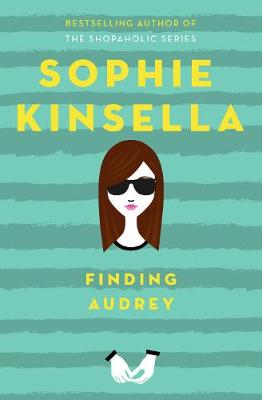Reviewed by meowstina on
I was very hesitant when I found out Sophie Kinsella was releasing a YA novel. I worried she might just be jumping on the ‘YA is super popular!’ bandwagon instead of writing this novel because she truly wanted to. Then I read the description, and it’s so serious compared to her other books, so I was once again worried. I’m glad I gave this a chance, though, because I like it just as much as those other books, even if it is a little different.
It almost feels like a completely different author wrote this book. The narrator, Audrey, is not flighty and silly, nor is the narration that way. Audrey is a pretty grounded, normal teenager. She has anxiety, among other disorders, and every day she fights to be brave and get through her crippling fear because she was part of some kind of traumatizing event. She wears sunglasses all the time because she can’t look into people’s eyes, and she never leaves the house. Kinsella handles and speaks about anxiety really well, surprisingly well to me. Everything is so accurate, it was really nice to read about (not nice as in pleasant, but nice as in ‘ah! that’s exactly how it feels!’ You know.). The only not-realistic part is Audrey’s speedy recovery, but alas, I suppose a book can only be so long.
An issue that is just as discussed as anxiety is Audrey’s brother’s ‘video game addiction.’ Half the book is literally Audrey’s mom yelling at her brother, trying to get him to do new activities and get away from the computer. I don’t know if it was just my mindset, because though it’s meant to be amusing, the mom’s incessant (incessant) screaming is kind of irritating and actually made me feel a bit anxious. I don’t think this needed to be such a big part of the plot, and didn’t see the point of it to be honest. I suppose it’s because that’s all Audrey encountered? The story is a lot about Audrey’s relationship with her family, too, because they’re an important part of her life. Soon, her brother’s friend, Linus, becomes just as important because he helps her on the road to recovery.
So, Audrey’s current state is due to a traumatic event. Thing is, though, we never find out what it is. A general topic is provided, but that’s about it. I’m still trying to decide if this is good or lazy. On one hand, it doesn’t matter what the event was. If the event was exposed, maybe readers would be trying to figure out why Audrey reacted so badly and questioning her feelings. Or, maybe in this case it’s easier for readers to place themselves in her story. On the other hand, it’s hard for readers to fully connect to the story if there is a missing piece, and it sort of feels like the story is incomplete. Both sides are valid, but I don’t know which one I’ve chosen yet. I’m leaning toward the former, but then again, you all know how I love a finished story.
In any case, I like this book. There are a lot of things that keep it from being amazing, but there are also good things. Though most people’s experiences aren’t quite as extreme as Audrey’s, hopefully it brings awareness to anxiety disorders and helps some people feel not so alone.
Reading updates
- Started reading
- 2 May, 2015: Finished reading
- 2 May, 2015: Reviewed
